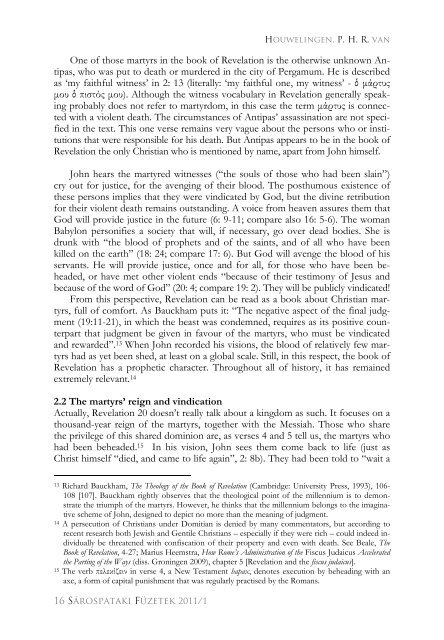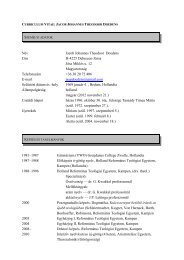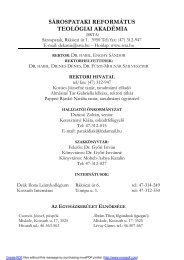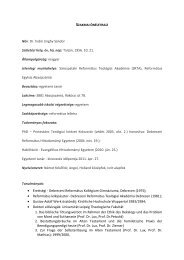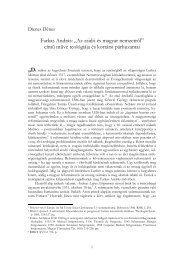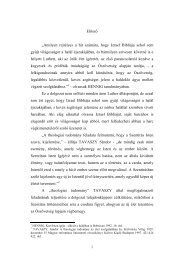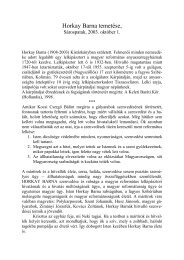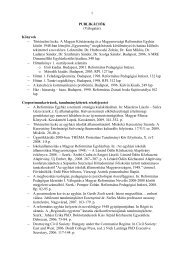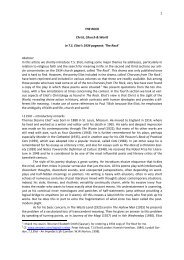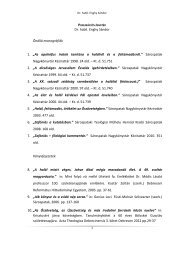2011/1 - Sárospataki Református Teológiai Akadémia
2011/1 - Sárospataki Református Teológiai Akadémia
2011/1 - Sárospataki Református Teológiai Akadémia
- No tags were found...
Create successful ePaper yourself
Turn your PDF publications into a flip-book with our unique Google optimized e-Paper software.
Houwelingen, P. H. R. van<br />
One of those martyrs in the book of Revelation is the otherwise unknown Antipas,<br />
who was put to death or murdered in the city of Pergamum. He is described<br />
as ‘my faithful witness’ in 2: 13 (literally: ‘my faithful one, my witness’ - ὁ μάρτυς<br />
μου ὁ πιστός μου). Although the witness vocabulary in Revelation generally speaking<br />
probably does not refer to martyrdom, in this case the term μάρτυς is connected<br />
with a violent death. The circumstances of Antipas’ assassination are not specified<br />
in the text. This one verse remains very vague about the persons who or institutions<br />
that were responsible for his death. But Antipas appears to be in the book of<br />
Revelation the only Christian who is mentioned by name, apart from John himself.<br />
John hears the martyred witnesses (“the souls of those who had been slain”)<br />
cry out for justice, for the avenging of their blood. The posthumous existence of<br />
these persons implies that they were vindicated by God, but the divine retribution<br />
for their violent death remains outstanding. A voice from heaven assures them that<br />
God will provide justice in the future (6: 9-11; compare also 16: 5-6). The woman<br />
Babylon personifies a society that will, if necessary, go over dead bodies. She is<br />
drunk with “the blood of prophets and of the saints, and of all who have been<br />
killed on the earth” (18: 24; compare 17: 6). But God will avenge the blood of his<br />
servants. He will provide justice, once and for all, for those who have been beheaded,<br />
or have met other violent ends “because of their testimony of Jesus and<br />
because of the word of God” (20: 4; compare 19: 2). They will be publicly vindicated!<br />
From this perspective, Revelation can be read as a book about Christian martyrs,<br />
full of comfort. As Bauckham puts it: “The negative aspect of the final judgment<br />
(19:11-21), in which the beast was condemned, requires as its positive counterpart<br />
that judgment be given in favour of the martyrs, who must be vindicated<br />
and rewarded”. 13 When John recorded his visions, the blood of relatively few martyrs<br />
had as yet been shed, at least on a global scale. Still, in this respect, the book of<br />
Revelation has a prophetic character. Throughout all of history, it has remained<br />
extremely relevant. 14<br />
2.2 The martyrs’ reign and vindication<br />
Actually, Revelation 20 doesn’t really talk about a kingdom as such. It focuses on a<br />
thousand-year reign of the martyrs, together with the Messiah. Those who share<br />
the privilege of this shared dominion are, as verses 4 and 5 tell us, the martyrs who<br />
had been beheaded. 15 In his vision, John sees them come back to life (just as<br />
Christ himself “died, and came to life again”, 2: 8b). They had been told to “wait a<br />
13 Richard Bauckham, The Theology of the Book of Revelation (Cambridge: University Press, 1993), 106-<br />
108 [107]. Bauckham rightly observes that the theological point of the millennium is to demonstrate<br />
the triumph of the martyrs. However, he thinks that the millennium belongs to the imaginative<br />
scheme of John, designed to depict no more than the meaning of judgment.<br />
14 A persecution of Christians under Domitian is denied by many commentators, but according to<br />
recent research both Jewish and Gentile Christians – especially if they were rich – could indeed individually<br />
be threatened with confiscation of their property and even with death. See Beale, The<br />
Book of Revelation, 4-27; Marius Heemstra, How Rome’s Administration of the Fiscus Judaicus Accelerated<br />
the Parting of the Ways (diss. Groningen 2009), chapter 5 [Revelation and the fiscus judaicus].<br />
15 The verb πελεκίζειν in verse 4, a New Testament hapax, denotes execution by beheading with an<br />
axe, a form of capital punishment that was regularly practised by the Romans.<br />
16 Sárospataki Füzetek <strong>2011</strong>/1


